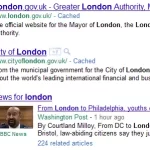Google searches have become so ingrained into our everyday lives that it’s easy to take for granted how amazing they really are.
No matter what you type in the search box, Google is able to query the billions and billions of webpages it has indexed and present a list of the most relevant results, seemingly instantly.
But your Google search actually embarks on a rather long journey during those milliseconds, involving many connected machines.
While many of the technical details are beyond the scope of this post (we plan to have a more comprehensive series of How Google Works in the future), the basics are still quite fascinating.
First of all, Google owns a staggering number of machines, estimated to be in the hundreds of thousands, which are located in many different datacenters around the world. These computers work together to help perform your searches.
When you hit the “search” button, your query gets sent to a particular cluster of thousands of computers. Each individual computer only contains a small fraction of the index, but together, they represent everything on the web that Google has crawled.
Your search terms are passed on to each of these computers simultaneously, which return a list of matches from their part of the index. Then the results from the individual machines are merged together and ranked according to Google’s search algorithm.
This combined list of results then gets sent back to your computer screen, just about a tenth of a second after you hit the search button.
A 2009 blog post reported that a single Google query uses 1000 Machines in 0.2 seconds, which is likely an even higher number today.
The Google search interface maybe be ridiculously simple to use, but don’t forget that there is an awful lot going on under the hood.



Even if you understand how the hole system works I think you will still find it amazing on how far the internet has evolved over very short period of time. The fact of the matter is it may still evolve in some away you can’t even imagine…
I agree Cristian! Google was revolutionary from day one, but they have made some incredible advancements in the last couple of years. I’m very curious what the web will look like in five, ten or twenty years’ time. Will we still use search engines? Or will we just be speaking into our smartphones and instantly getting connected to relevant results?
You can already speak into your smartphone and get instantly connected to relevant results. So last year. 😉
Well, you’re right! We can do this now, of course.
But I think the bigger question is still whether we can get “instantly connected to relevant results.” SIRI and other virtual personal assistants are good at doing simple tasks and deferring to Google web’s standard list of links in other cases.
But the vision that I was referring to is more of one where we don’t have to sift through lists of links and instead get answers from these devices. When so many queries require some deeper analysis, it is a very difficult problem.